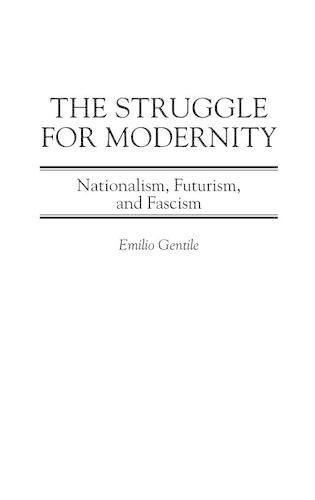
The Struggle for Modernity: Nationalism, Futurism, and Fascism
(Hardback)
Publishing Details
The Struggle for Modernity: Nationalism, Futurism, and Fascism
By (Author) Emilio Gentile
Bloomsbury Publishing PLC
Praeger Publishers Inc
30th November 2003
United States
Classifications
General
Non Fiction
Politics and government
945.091
Physical Properties
Hardback
224
Width 156mm, Height 235mm
482g
Description
During the 20th century, Italy experienced some regrettable political developments. It was the first European nation after World War I in which a mass militia-party of revolutionary nationalism achieved power and abolished parliamentary democracy with the goal of building a totalitarian state. It was also the first in Europe to institutionalize the sacralization of politics and to celebrate officially the cult of the leader as a demi-God. These achievements were not accidents. Since the beginning of the 20th century, Italian nationalist movements, from the national radicalism of La Voce to futurist nationalism and fascism, fostered one of the strongest waves of European right-wing radicalism. The confrontation between nationalism and modernity is one of the main keys to understanding to the permutations of Italian radical nationalism from modernist avant-gardes up to the fascist regime. This book analyzes the ideological undercurrents and cultural myths that unite all these movements. Looking at Italian nationalism from its risorgimento roots to the neo-fascist heritage, Gentile considers the relationship between myth and organization in the making of the fascist state, the role of the party, the liturgy of mass politics in Italy, the fascist organizations abroad, and the attitude of fascist culture toward the United States.
Reviews
"Emilio Gentile is the leading authority on the history of Italian Fascism. This collection of essays demonstrates his innovative approach to the perplexing notion of modernist politics through original research in intellectual and cultural history. Gentile brilliantly explores the connections between modernism and Fascism and posits the category of modernist nationalism as a key element in understanding the origins of Fascism and the nature of its regime."-Philip V. Cannistraro Distinguished Professor, Queens College, City University of New York
"Gentile has long been regarded in Italy as the premiere historian of fascism of his generation but, to date, the appearance of his work in English has been dispersed and selective. Now, with his new book, which brings together both new essays and previously published ones, English-language readers are for the first time in a position to appreciate the full range of Gentile's scholarly resourcefulness about, and comprehensive understanding of, his subject, as well as his dexterity as an historian and the sprightly writing and unfailing critical acumen that have made his work so important. There is no better introduction in English to the complex historiography of the origins and nature of Italian fascism."-Walter L. Adamson Professor of History, Emory University
"This collection of essays displays Gentile's outstanding capacity to analyze Fascism's uniqueness, while locating it firmly within the wider context of modern history. . . . It should help convince a new generation of Anglophone scholars that Gentile is a master in his own right."-Roger Griffin Oxford Brookes University, Oxford
[O]ffers a good range of Gentile's insightful analysis of fascism's contentiousl relationship to modernity and demostrates the value of intellectual-cultural history for understanding the fascist phenomenon.-The American Historical Review
[T]his is without a doubt one of the best books in English on the relationship between politics and the culture of modernism in Italy. It is to be hoped that it will be read not only by Italianists, but by scholars of modernism tout court, to whom it will offer a nuanced, complex and cliche-free perspective on early twentieth-century Italian culture.-Modern Italy
This volume affords its English-language readership an enticing introduction to the highly charged contemporary historiography that surrounds the figure of Benito Mussolini, his regime, and his era....Recommended. Upper-division undergraduates and above.-Choice
"Offers a good range of Gentile's insightful analysis of fascism's contentiousl relationship to modernity and demostrates the value of intellectual-cultural history for understanding the fascist phenomenon."-The American Historical Review
"This is without a doubt one of the best books in English on the relationship between politics and the culture of modernism in Italy. It is to be hoped that it will be read not only by Italianists, but by scholars of modernism tout court, to whom it will offer a nuanced, complex and cliche-free perspective on early twentieth-century Italian culture."-Modern Italy
"[T]his is without a doubt one of the best books in English on the relationship between politics and the culture of modernism in Italy. It is to be hoped that it will be read not only by Italianists, but by scholars of modernism tout court, to whom it will offer a nuanced, complex and cliche-free perspective on early twentieth-century Italian culture."-Modern Italy
"[O]ffers a good range of Gentile's insightful analysis of fascism's contentiousl relationship to modernity and demostrates the value of intellectual-cultural history for understanding the fascist phenomenon."-The American Historical Review
"This volume affords its English-language readership an enticing introduction to the highly charged contemporary historiography that surrounds the figure of Benito Mussolini, his regime, and his era....Recommended. Upper-division undergraduates and above."-Choice
Author Bio
EMILIO GENTILE is a contemporary historian of international reputation and a leading scholar of Fascism, totalitarianism, and political religions. He is the author of twelve books, and his major works and articles have been translated into English, French, German, Spanish and Portuguese. He is co-editor of Totalitarian Movements and Political Religions and is on the editorial boards of The Journal of Contemporary History and Modernism/Modernity. He currently teaches in the Department of Political Studies at the University of Rome.
